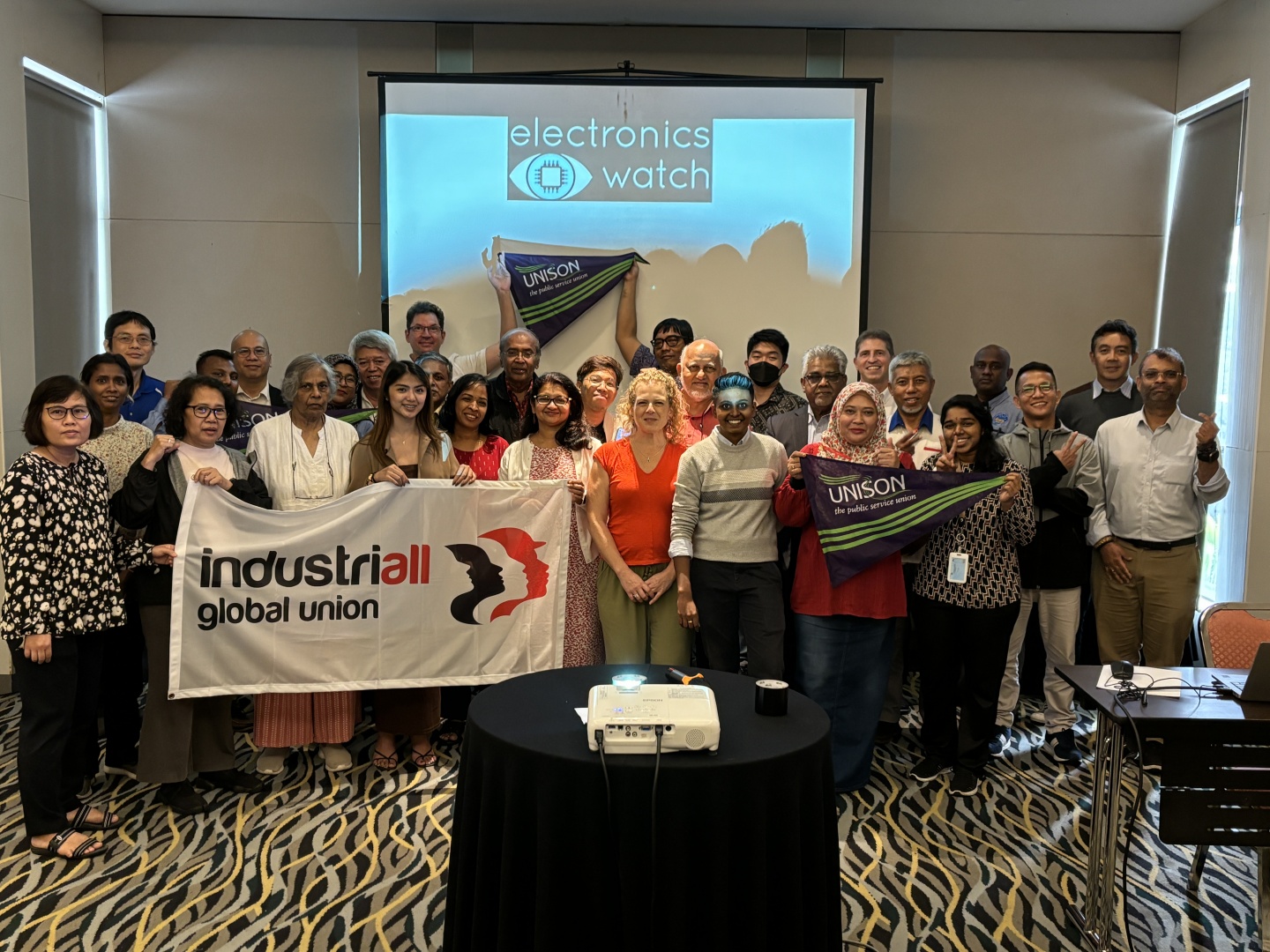Read this article in:
English
25 October, 2024Thirty unionists and activists from national and international migrant worker organizations across Asia-Pacific and Europe gathered in Kuala Lumpur on 23 October to discuss principles and best practices for implementing worker-driven remedies.
The workshop became a continuation of the work that started in June and November 2022 which resulted in development of Principles of Worker-Driven Remedy published in October, this year, as a guiding framework for public buyers and other stakeholders to address harm caused to workers in supply chains.
These Principles consider remedy as a right, based on international human rights law and international labour standards, with workers at its core. Workers and trade union organizations, as right-holders, should participate in the design of remedy processes as well as in decision and implementation bodies.
The October workshop brought together IndustriALL affiliates, Electronics Watch, Unison, and civil society organizations(CSO) advocating for migrant workers’ rights. The goal was to deepen their understanding of these principles and develop a roadmap for effective implementation, equipping participants with tools needed to enhance their advocacy and enforcement efforts.
Gemma Freedman, the Unison international officer, said:
“We identified remedy principles in the past two years and learnt from our failure and success in applying the principles. Now we should strategize our actions and overcome it collectively. We ought to use all available guides, tools and resources to advocate for the worker-driven remedy.”
However, while leveraging the remedial mechanisms, there is a consensus that workers and unions must involve workers that are organized and based on their needs. Worker organizations must put workers at the centre and not harm workers who need remedial actions, otherwise the organizations will lose legitimacy.
Omana George, monitoring and civil society engagement manager of Electronics Watch, said:
“In essence, worker-driven remedies must respect human rights law, protect freedom of association, be timely and transparent. The remedy process must remove barriers of worker participation, shared responsibility of stakeholders and inclusion of various reparation measures.”
During the workshop, participants engaged in detailed discussions to fully understand the principles ensuring that IndustriALL affiliates and CSO participants grasped their intended impact, opportunities, and risks. Through group activities and presentations, attendees explored the prerequisites for creating effective remedy mechanisms and shared insights on how these principles could be applied across different industries and contexts.
This collaborative effort helped participants identify key areas where worker-driven approaches could make a significant difference in addressing migrant workers’ rights and recruitment abuses.
Participants also worked together to identify challenges that could hinder the implementation of the principles: legal, evidential, and resource-based obstacles. They discussed potential external threats and strategized solutions for overcoming these barriers in a sustainable manner. Additionally, the group developed ideas for the tools, guidance, and resources necessary to support the advocacy and practical implementation of these principles.
This included sharing best practices, innovative strategies, and recommendations on what should be included in the guidance document to ensure its relevance and accessibility for all stakeholders.
IndustriALL director of ICT electrical and electronics, Alexander Ivanou, shared a number of cases of violation of workers’ rights in the electronics sector in South East Asia region. Employers regularly discriminated against workers by interfering in secret ballot exercises, committing forced labour practice, breaching collective agreements and laying off union officials.
“Organizing is critical in building workers’ power to address forced labour practices and anti-union discrimination. Several case studies show how collective actions can force employers to return to bargaining tables and provide remedy.”
In 1998, governments, employers, and workers' organizations committed to upholding basic human values by adopting the ILO Declaration on Fundamental Principles and Rights at Work. This declaration outlines fundamental rights at work, and adherence is linked to the membership status of ILO countries. Despite this, violations of these rights are increasing, with the 2024 ITUC Global Rights Index reporting widespread erosion of democratic values and labor rights, including 87% of 151 countries violating the right to strike and 79 per cent infringing on collective bargaining rights.
Additionally, the 2022 Global Estimates of Modern Slavery reported that 27.6 million people are trapped in forced labour, a number that has grown by 2.7 million since 2016. Migrant workers, particularly women and youth, are more than three times as likely to face forced labour due to factors like weak legal protections and exploitative recruitment practices.
While some unionized factories still face forced labour allegations, independent and democratic trade unions can significantly reduce, and potentially eliminate, the risk of forced labour.
